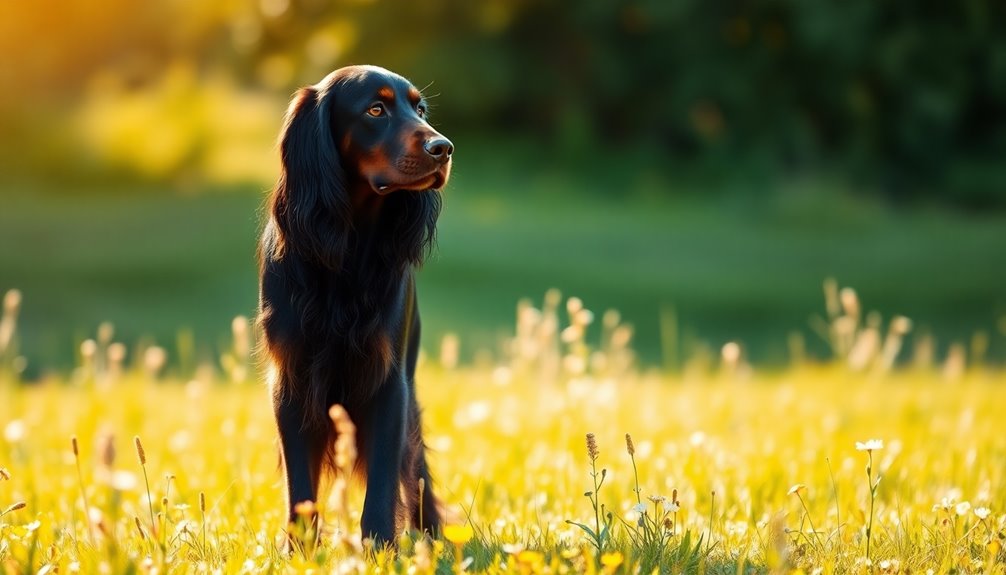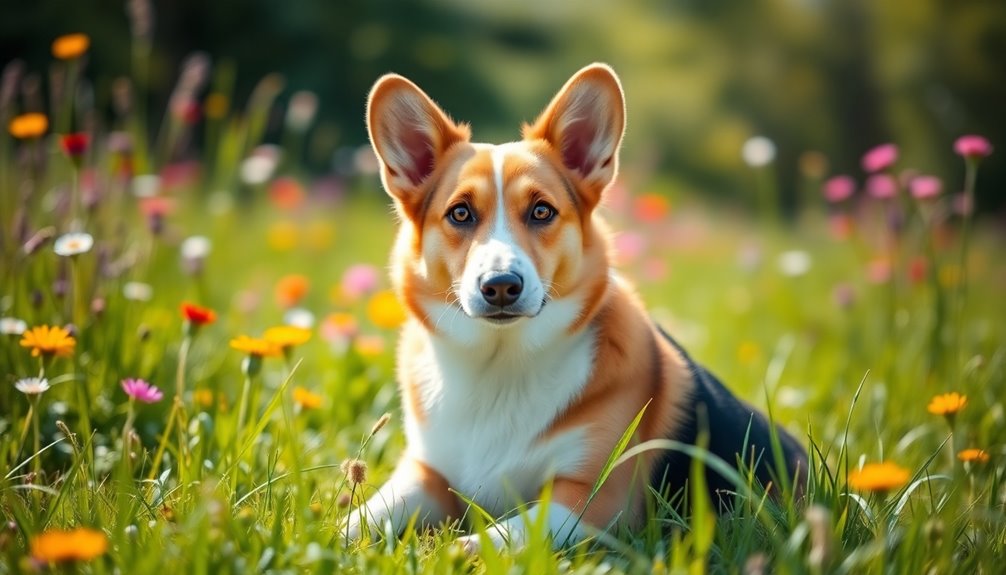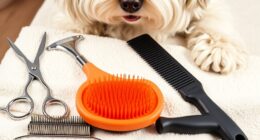If you're looking for a family-friendly dog, Goldendoodles are a fantastic choice. They're friendly, playful, and highly trainable, making them great companions for kids and other pets. With their hypoallergenic coats, they're also a good fit for those with allergies. Standing at various sizes, from Toy to Standard, there's a Goldendoodle for every household. Regular grooming and exercise keep them happy and healthy, while their emotional sensitivity means they thrive on human interaction. If you want to explore more about their needs and characteristics, you're in for a treat!
Key Takeaways
- Goldendoodles are affectionate and friendly, making them ideal companions for families with children and other pets.
- Their high intelligence and easy trainability make them suitable for first-time dog owners.
- Available in various sizes, Goldendoodles can fit into different living situations and family dynamics.
- They have a low-shedding, hypoallergenic coat, making them a good choice for allergy sufferers.
- Regular exercise and socialization ensure a happy and well-adjusted Goldendoodle, enhancing family life.
Introduction
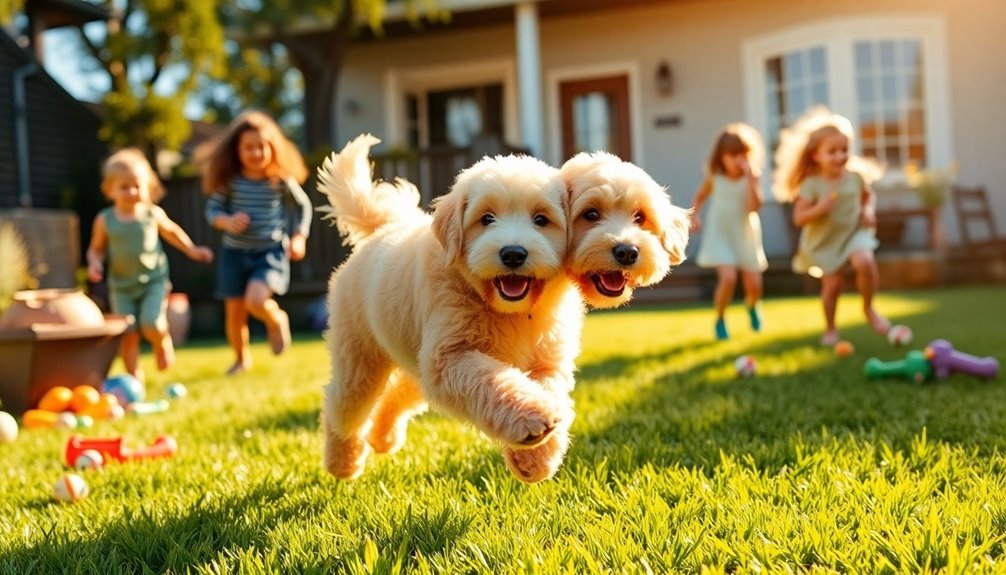
Goldendoodles are quickly becoming one of the most popular dog breeds for families and individuals alike. If you're looking for a loving companion, their affectionate and friendly nature makes them an ideal choice.
With a high intelligence level, these pups are easily trainable, which is perfect for first-time dog owners. Their gentle disposition ensures they're great with children and other pets, making them a wonderful addition to any household.
Goldendoodles thrive on human interaction and are highly social, so expect to spend plenty of time bonding with your furry friend. They're also sensitive to your emotions, acting as empathetic companions during both joyful and challenging times.
In terms of physical characteristics, Goldendoodles boast a low-shedding, hypoallergenic coat that comes in various colors like gold, cream, apricot, and red. They come in Miniature and Standard sizes, catering to different living situations. Additionally, their lifespan averages 10 to 15 years, allowing for many years of companionship.
While they've moderate grooming needs, daily brushing will keep their coats healthy and shiny.
If you're ready for an active, engaging, and loving pet, a Goldendoodle might just be the perfect fit for your family.
History and Origin
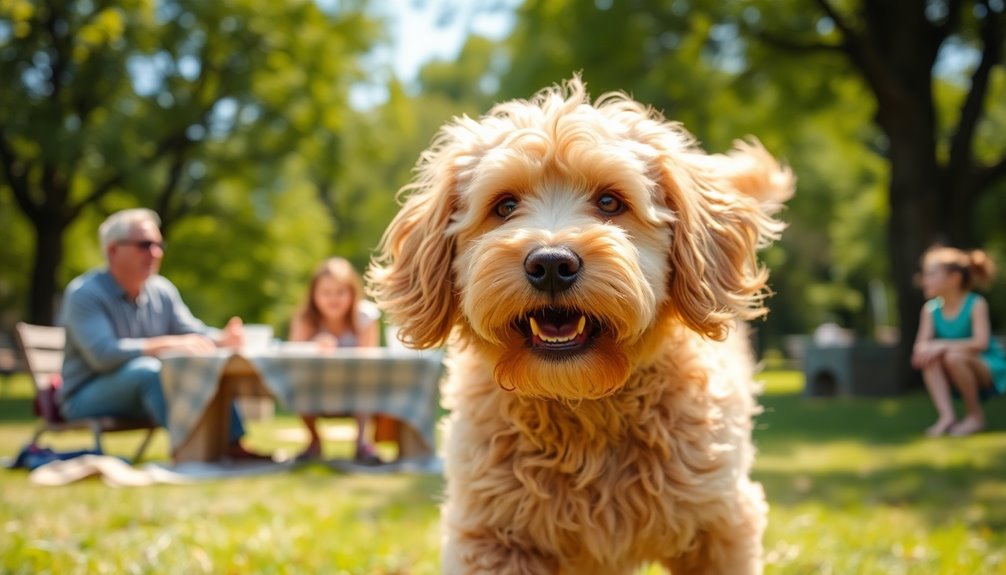
Goldendoodles first emerged in the United States in 1969, aiming to create the ideal hypoallergenic family companion. By blending the Golden Retriever's gentle nature with the Poodle's low-shedding coat, breeders sought to develop a friendly and intelligent dog. This unique mix quickly gained traction as a loving pet for families and individuals alike. Over the years, the breed has become one of the most popular choices for families due to its loyalty and positive temperament.
Where and when the breed originated
In the late 1960s, a new breed began to emerge in the United States, sparked by the desire to create a guide dog that combined the intelligence of Poodles with the gentle temperament of Golden Retrievers. The initial breeding aimed to produce a dog that wouldn't only be smart but also have a calm nature, making it ideal for assisting those with visual impairments. While some accounts suggest that Goldendoodles originated in the 1990s, the earliest recorded breeding happened in 1969. Monica Dickens is credited with breeding the first Goldendoodle in 1992 for a specific client need—a hypoallergenic guide dog for a blind woman. This breeding was motivated by the need for a dog that would shed less, making it suitable for families and individuals with allergies. As the breed's popularity grew, breeders began experimenting with different sizes and variations, primarily focusing on creating family pets and companion animals. Goldendoodle height variations also became a point of interest as breeders worked to accommodate various family needs and preferences.
Hypoallergenic Family Companion Dog
Emerging from a desire to create a family companion that's both intelligent and hypoallergenic, the Goldendoodle has quickly captured the hearts of many.
With its low-shedding coat inherited from Poodles, this breed significantly reduces loose hair and dander in your home. The curly or wavy fur effectively traps dander, preventing it from becoming airborne and triggering allergic reactions. Additionally, their reduced shedding helps ensure that fewer allergens are present in your living environment.
If you're considering a Goldendoodle, you'll notice that F1B and F2B variations, which boast higher Poodle genetics, offer enhanced hypoallergenic traits.
Regular grooming is vital; brushing and bathing will help manage allergens, keeping your living space cleaner. Plus, maintaining good indoor air quality with purifiers complements their hypoallergenic qualities.
Before bringing one home, spend time with a Goldendoodle to gauge your allergy reactions. Their gentle nature and intelligence make them excellent family pets, particularly for households with children.
With the right care and consideration of individual health factors, Goldendoodles can be a wonderful addition to families seeking a loving, hypoallergenic companion.
Physical Characteristics
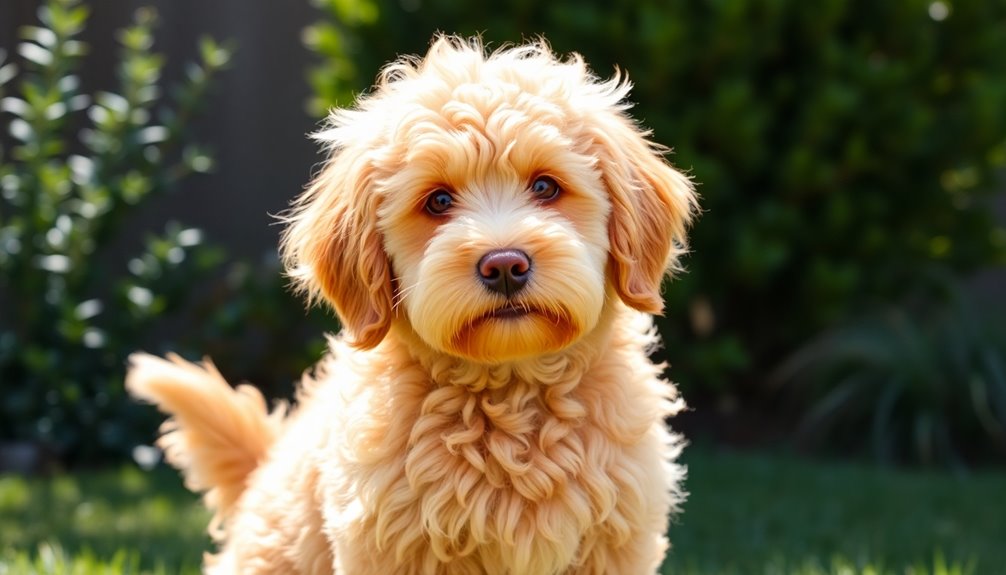
When you look at a Goldendoodle, you'll notice a range of sizes, from the tiny Toy to the sturdy Standard, each boasting a unique weight and height.
Their coats can be curly or shaggy, often low-shedding, making them a popular choice for those seeking a hypoallergenic pet.
With proper grooming, their beautiful fur can truly shine, capturing the best traits of both the Poodle and Golden Retriever. Additionally, Goldendoodles can weigh anywhere from 15-100 lbs, depending on whether they are Miniature or Standard.
Size, weight, and coat details
Goldendoodles come in a variety of sizes, weights, and coat types, making them a versatile choice for different living situations and preferences. You can find Toy Goldendoodles weighing between 10-25 pounds and standing under 15 inches tall, perfect for small spaces. Mini Goldendoodles fit well in apartments, weighing 15-35 pounds and measuring 13-20 inches. If you want something a bit bigger, Medium Goldendoodles range from 25-45 pounds and stand 15-20 inches tall, offering a balanced option. For families with ample space, Standard Goldendoodles are your best bet, weighing 50-90 pounds and reaching heights of 20-26 inches.
As for their growth, Toy and Mini Goldendoodles usually reach their adult weight by 7.5-11 months, while Medium and Standard varieties take a bit longer, fully maturing by 11-16 months. Growth patterns show that the fastest growth occurs in the first 6 months, emphasizing the importance of proper nutrition during these critical phases. Each size has its own unique charm, allowing you to choose based on your lifestyle and living conditions. Regardless of the size, Goldendoodles are known for their friendly demeanor and adaptability, ensuring they fit seamlessly into your family life.
Curly, Hypoallergenic Coat Texture
The distinctive coat of a Goldendoodle boasts a curly, wool-like texture that closely resembles that of its Poodle parent. This tightly coiled fur feels wooly to the touch and adds to the breed's charm. However, maintaining this beautiful coat requires regular grooming to prevent matting. You'll need to brush your Goldendoodle several times a week, ensuring that you pay special attention to high-friction areas where mats are more likely to develop. Professional grooming every six to eight weeks is also recommended to keep your pup looking its best. While many people believe Goldendoodles are non-shedding, they're not entirely hypoallergenic. They inherit low-shed characteristics from their Poodle lineage, making them suitable for some allergy sufferers, but individual reactions can vary. The hypoallergenic qualities depend on genetic factors, including the KRT71 gene, which determines the coat curl. Genetic combinations from both parent breeds contribute to the overall coat type, and the presence of furnishing genes can influence the amount of hair on the face and body. With proper care, your Goldendoodle's coat can be a delightful feature that enhances your family's experience with this lovable breed. Additionally, maintaining a healthy diet rich in nutrients like omega-3 fatty acids can further support the overall health and shine of your Goldendoodle's coat.
Temperament and Personality
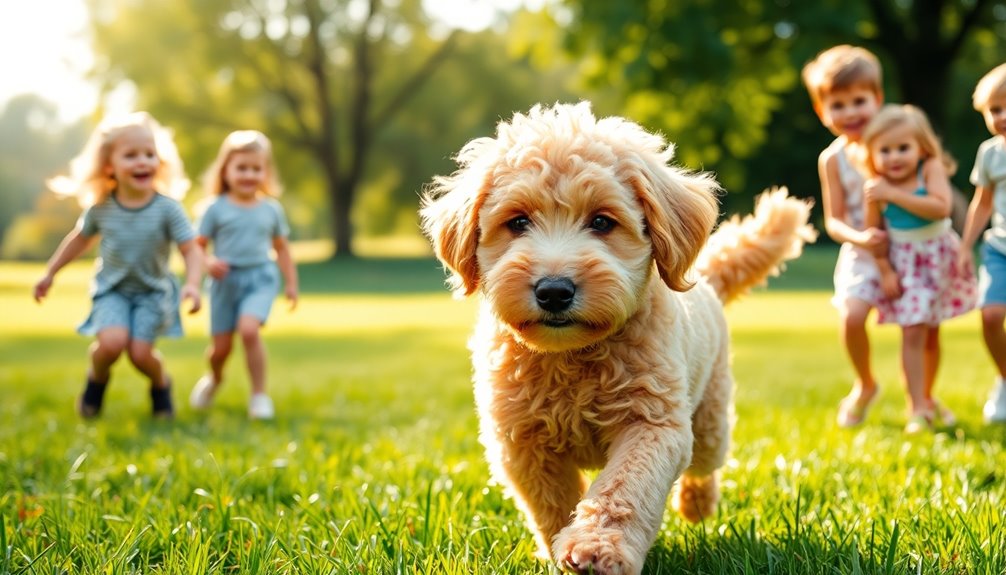
Goldendoodles are known for their playful and sociable demeanor, making them a fantastic choice for families or individuals alike. You'll find that they easily get along with children and other pets, creating a harmonious household environment. Their friendly nature ensures they'll thrive in any setting where they receive plenty of love and attention. Additionally, their affectionate and gentle disposition makes them ideal companions for families with diverse dynamics.
Playful and Sociable Demeanor
With their playful and sociable demeanor, Goldendoodles make delightful companions for families and individuals alike. These fun-loving dogs thrive on playtime, whether it's a game of fetch or a long walk in the park. Their high energy level means they need regular exercise to stay happy and prevent any destructive behavior. Establishing healthy screen time habits is essential for families as they integrate pets into their lives.
Playing in the yard or engaging in physical activities is essential for keeping them balanced and content. Goldendoodles are highly social and form strong bonds with their human families. They love being included in household activities, and early socialization is crucial for raising a well-adjusted adult dog. Their friendly nature extends to other pets, making them great companions for dogs and even cats, provided they've been properly socialized.
Not only are they playful and social, but they're also sensitive to your emotions. Goldendoodles can pick up on stress and discord in the home, so creating a calm environment is vital for their happiness. Additionally, their intelligent and adaptable nature allows them to thrive in various living situations, making them suitable for both families and apartment dwellers.
With their intelligence and intuitive nature, they respond well to positive reinforcement training, making them a joy to train and an excellent addition to any home.
Suitability for families, individuals, or other pets
Families and individuals alike will find Goldendoodles to be wonderfully suitable companions thanks to their affectionate and adaptable nature. Their friendly personalities thrive on human interaction, forming strong bonds with both kids and adults.
With a gentle disposition, Goldendoodles are perfect for families with children, offering protection and emotional support while requiring early socialization for well-adjusted behavior. Additionally, their intelligence and loyalty make them great family companions who are eager to engage with all members of the household.
These dogs have high energy levels, so they need regular exercise to prevent destructive behavior. Engaging in activities like fetch and structured play keeps them happy and healthy.
Goldendoodles are also highly intelligent and eager to please, making training a breeze with positive reinforcement techniques.
For individuals, Goldendoodles provide companionship and alleviate loneliness. Their loyalty means they bond strongly with their owners, but they can suffer from separation anxiety if left alone for too long.
They thrive on social interaction and can adapt well to various living situations.
When it comes to other pets, Goldendoodles generally get along well with dogs of similar sizes and energy levels. With proper socialization, they can coexist happily with other animals, making them a versatile choice for families and individuals alike.
Health and Lifespan
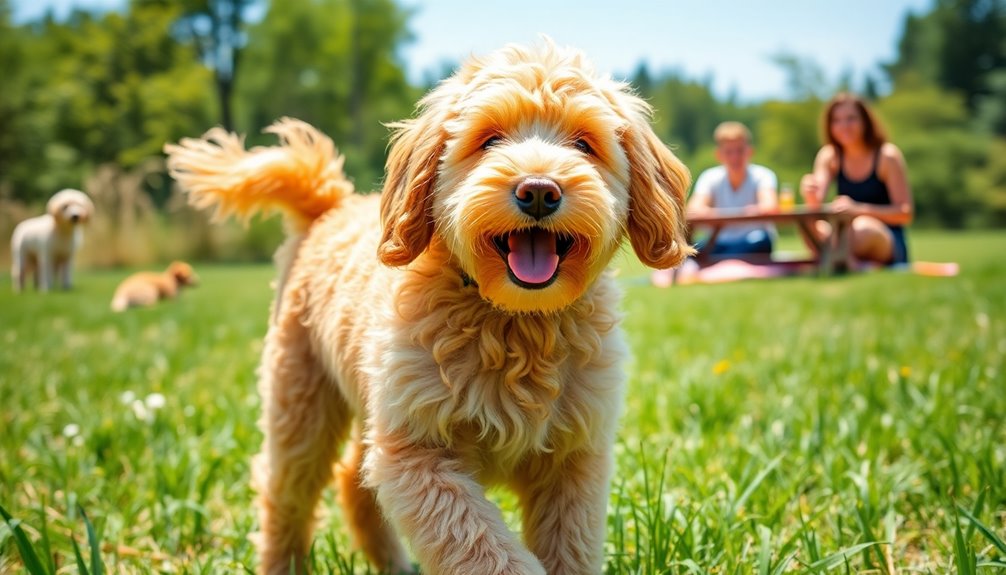
When it comes to your Goldendoodle's health and lifespan, it's crucial to be aware of common issues like hip dysplasia and progressive retinal atrophy. Typically, these dogs live between 10 to 15 years, but with proper care, some can even reach 17 or 18. Maintaining a healthy weight and scheduling regular vet check-ups can go a long way in ensuring your furry friend stays healthy and happy. Additionally, genetic makeup plays a significant role in the overall health and longevity of your Goldendoodle, as beneficial traits from their parent breeds can help reduce susceptibility to certain health conditions.
Typical lifespan of the breed
Goldendoodles typically enjoy a lifespan that ranges from 10 to 15 years, though some can live up to 16 or 17 years with proper care. The lifespan of your Goldendoodle can be influenced by genetics inherited from their parent breeds. Interestingly, smaller Goldendoodles, like Miniature and Toy varieties, tend to live longer than Standard Goldendoodles. This is due to smaller dogs aging more slowly and being less prone to health issues like obesity.
Several factors can impact your Goldendoodle's longevity. Providing a balanced diet rich in high-quality protein, healthy fats, and carbohydrates is crucial. Regular veterinary visits, preventative care, and maintaining a healthy weight through exercise and mental stimulation play significant roles as well. Additionally, Goldendoodles have fewer allergens compared to other breeds, making them suitable for allergy sufferers, which can contribute to a healthier living environment.
Environmental factors, such as exposure to toxins, can negatively affect their lifespan. As your Goldendoodle ages, their care needs will shift, so be prepared to adjust their diet and exercise levels accordingly. With a loving home and attentive maintenance, you can help your Goldendoodle reach the upper end of their lifespan and enjoy many happy years together.
Common health concerns or genetic predispositions
As you welcome a Goldendoodle into your home, it's important to be aware of the common health concerns and genetic predispositions that may affect your furry friend.
Goldendoodles can inherit joint and skeletal issues from their parent breeds, such as hip dysplasia and elbow dysplasia, both of which can lead to arthritis and lameness. Osteochondrosis, another condition affecting joint health, is also a concern.
Eye problems are prevalent in Goldendoodles, including cataracts, glaucoma, and progressive retinal atrophy (PRA). These conditions can significantly impact your dog's vision. Additionally, issues like entropion and extra eyelashes can cause irritation.
Heart and circulatory concerns, such as subvalvular aortic stenosis, are hereditary and require monitoring. Goldendoodles may also face risks like bloat and thyroid problems, including hypothyroidism.
Beyond these, other health issues include allergies, cancer, and gastrointestinal problems, which can manifest as vomiting or loose stools. Cancer is a significant risk in Goldendoodles, making regular veterinary checkups essential for early detection.
Managing your Goldendoodle's weight is crucial, as overindulgence may lead to obesity. By understanding these potential health concerns, you can help ensure a happy and healthy life for your Goldendoodle.
Tips for maintaining health and wellness
Maintaining your Goldendoodle's health and wellness is essential for ensuring a long, vibrant life. Start by providing high-quality dog food tailored to their age, size, and activity level. Avoid table scraps and human food to prevent digestive issues and nutrient imbalances. Incorporate fresh fruits and vegetables for added vitamins and minerals, and consult your veterinarian about feeding habits to maintain a healthy weight. Including anti-inflammatory foods can also support overall health.
Regular exercise is crucial, so aim for at least three long walks daily or around half an hour of playtime. Activities like fetch, swimming, and hiking will keep them physically fit. Additionally, consider incorporating joint supplements as they can be beneficial after one year of age for joint support.
Don't forget mental stimulation; puzzle toys can be a great addition to their routine. Engaging in activities that challenge their minds can help prevent behavioral issues and promote well-being.
Preventative care is vital, too. Regular grooming, including monthly ear cleaning, supports skin and coat health. Schedule consistent veterinary check-ups to catch any health issues early. Dental care should also be part of your routine.
Finally, create a safe and secure living environment. Avoid exposure to extreme temperatures and pollutants, and maintain predictable routines to reduce stress.
With these tips, your Goldendoodle can thrive and enjoy a happy, healthy life.
Care Requirements
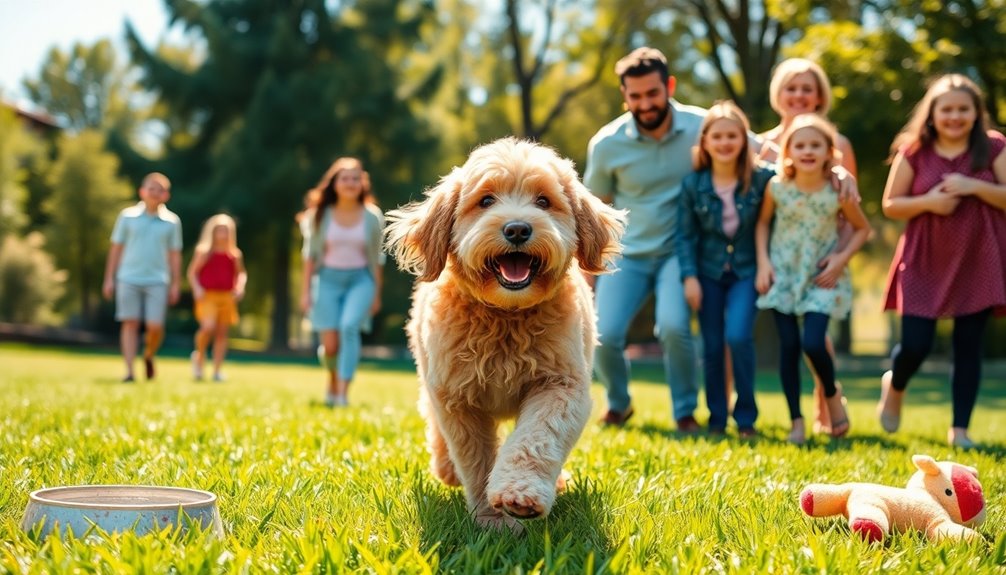
Caring for your Goldendoodle involves regular brushing, ensuring they get enough exercise, and providing a balanced diet. You'll need to brush their coat several times a week to keep it tangle-free while also meeting their energetic needs with daily walks and playtime. Additionally, choosing the right food can greatly impact their overall health and well-being. Regular grooming appointments for professional trimming help maintain their coat and overall appearance.
Regular Brushing Required
Daily brushing is essential for keeping your Goldendoodle's coat healthy and tangle-free. Spend about 5-10 minutes each day brushing your dog, using a high-quality slicker brush to prevent mats and tangles. If your Goldendoodle has a curly coat, daily brushing is crucial. For those with wavy or straight coats, brushing every two days will suffice. This routine not only keeps the coat looking great but also distributes natural oils evenly, ensuring a shiny appearance.
Start brushing early in your puppy's life to help them get used to the process. Investing in a dematting tool and detangling spray can be invaluable for tackling tougher knots. After brushing, always check for mats by running a comb through their coat. Regular grooming also allows for monitoring skin health, which can help catch any issues early on.
To prevent matting, be gentle—avoid rubbing the coat and consider blow-drying while brushing.
In addition to regular brushing, remember to bathe your Goldendoodle once a month or as needed, followed by thorough blow-drying and brushing. Keeping up with these grooming practices will help you maintain a happy, healthy Goldendoodle.
Exercise requirements and energy levels
Goldendoodles are energetic companions that thrive on regular exercise to stay happy and healthy. Depending on their age and size, your Goldendoodle's exercise needs will vary. For puppies, aim for 15-30 minutes of exercise, 2-3 times a day. As they grow, a 3-month-old requires about 15 minutes twice daily, while a 6-month-old needs 30 minutes. By the time they reach 9 months, they should get around 45 minutes twice daily.
Adult Goldendoodles, particularly the standard ones, need between 30 to 120 minutes of exercise daily. Daily exercise is crucial for controlling obesity and maintaining a healthy weight in your Goldendoodle.
When it comes to size, standard Goldendoodles require more exercise compared to mini and toy varieties. You should provide a mix of outdoor activities like hiking or jogging, interactive games like fetch, and even indoor activities such as puzzle toys for mental stimulation.
Regular exercise helps manage their high energy levels, promotes health, and supports muscle development. It also offers mental enrichment and strengthens the bond between you and your pet through shared experiences.
Staying active is crucial for your Goldendoodle's overall well-being, so make sure to establish a structured routine to meet their needs.
Feeding tips and diet recommendations
Providing your Goldendoodle with a balanced diet is crucial for their overall health and well-being. Focus on high-quality dog food where animal-based protein is the primary ingredient. Lean meats like chicken, turkey, beef, or fish are excellent sources of protein that support muscle health. Including high-quality protein sources in their diet not only aids in muscle maintenance but also contributes to their overall energy levels.
Incorporate fresh fruits and vegetables in moderation, such as apple slices, blueberries, and carrots, along with whole grains like brown rice and quinoa for complex carbohydrates and fiber.
It's essential to avoid certain foods that can be harmful. Steer clear of chocolate, grapes, raisins, onions, garlic, avocado, and macadamia nuts. These can lead to serious health issues for your furry friend.
For feeding guidelines, adult Goldendoodles typically need 1 to 3 cups of dry dog food daily, split into two meals. Puppies require more frequent meals and higher caloric intake, while seniors may benefit from lower-calorie diets rich in fiber.
Always practice portion control to prevent obesity, and consult your veterinarian for personalized feeding recommendations based on your dog's size, age, and activity level. This will help ensure your Goldendoodle thrives and enjoys a long, happy life.
Training and Socialization
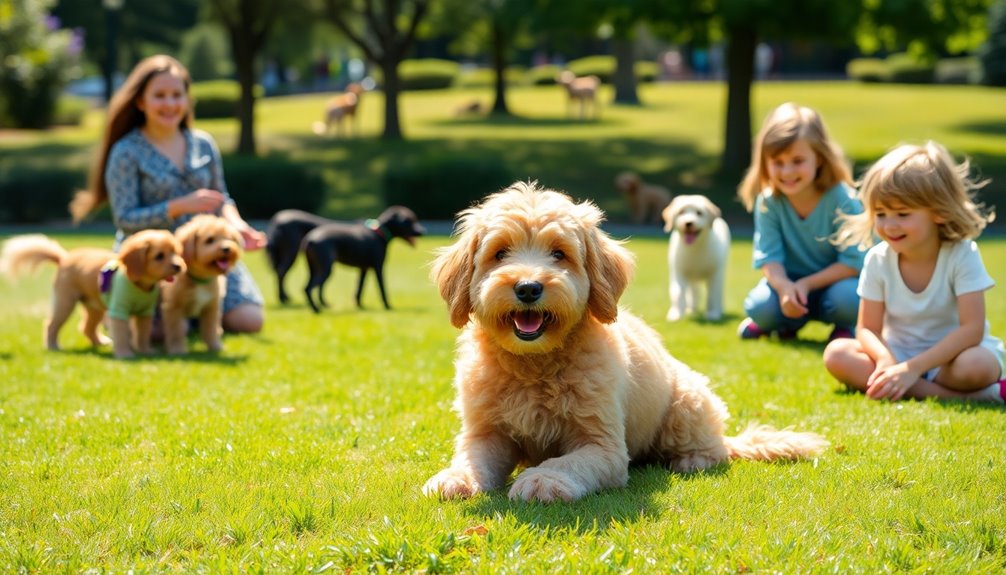
Training and socializing your Goldendoodle is essential, especially since they're highly intelligent and eager to learn. Gradual introductions to new environments help them adapt and build confidence, while also minimizing the risk of separation anxiety in puppies. Establishing a consistent routine during training sessions fosters a sense of security that is crucial for their overall development.
Highly Intelligent and Eager
Although many dogs can be trained, few match the Goldendoodle's remarkable intelligence and eagerness to learn. With their Poodle and Golden Retriever heritage, these pups are quick learners, grasping new concepts and commands rapidly.
You'll find that they thrive on positive reinforcement methods, like clicker training, which combine rewards and clear communication. Their high food drive makes treats particularly effective, so be sure to have some ready during training sessions.
Goldendoodles are eager to please, and consistency in your training routine will yield the best results. Early training and socialization are essential, shaping your pup into a confident adult dog. Consistent training helps establish good manners and behavior in puppies, reinforcing calm behavior in various situations.
Start with simple commands like "sit" and "stay," and gradually increase the challenge as they master each skill. Structured environments that stimulate their minds are a must, as they flourish when given mental challenges.
Additionally, consider enrolling your Goldendoodle in training classes. These not only teach basic commands but also provide vital socialization opportunities.
Gradual Introductions to New Environments
A gradual introduction to new environments is crucial for your Goldendoodle's development and well-being. Start socializing your puppy between three weeks and 14-16 weeks, as this is the optimal period for forming positive associations. Consistent socialization leads to a happier and healthier dog, reducing stress-related health issues.
Introduce them to different people, animals, and settings to prevent fear and anxiety later in life. Programs like Puppy Culture can provide daily exposure to various stimuli.
When introducing your Goldendoodle to other animals, ensure they interact with different dogs to learn essential social cues. Supervise closely, especially with cats, allowing them to sniff and gradually build bonds.
If negative reactions occur, separate them and reintroduce slowly.
Expose your Goldendoodle to diverse environments like parks and busy streets, and familiarize them with everyday sounds like traffic or household appliances.
Begin with softer noises, increasing the volume gradually while rewarding calm behavior.
Keep all interactions positive to build their confidence. Use treats and praise to reinforce good behavior, and ensure gentle handling to prepare them for vet visits.
Balance socialization with calm downtime to prevent overstimulation, and always monitor for signs of stress to adjust interactions as needed.
Separation Anxiety in Puppies
Dealing with separation anxiety in your Goldendoodle can be challenging, but understanding its roots is key to helping your puppy cope. Goldendoodles are social and intelligent, often forming deep bonds with their owners. This strong attachment can lead to anxiety when left alone, especially if they haven't learned how to be independent.
To manage separation anxiety, start by establishing a consistent routine for eating, exercising, and alone time. Use positive reinforcement to encourage calm behavior and gradually train your puppy to spend short periods alone. Crate training can be beneficial, providing a safe space for your Goldendoodle. It is important to note that separation anxiety is one of the most common behavioral disorders in dogs.
Early socialization is crucial. Introduce your puppy to other dogs and people to build confidence and reduce anxiety. Offer mental stimulation with toys and regular playtime to keep them happy and tired.
Create a comforting environment with favorite toys and familiar scents. You might consider tools like pet cameras or Thundershirts to ease their anxiety.
If needed, explore doggy daycare or hiring dog walkers for extra support. With patience and the right strategies, you can help your Goldendoodle learn to feel secure when alone.
Ideal Living Environment

To keep your Goldendoodle happy and healthy, a spacious backyard for playtime is essential. They love to run and explore, so having plenty of room to stretch their legs will benefit their physical and mental well-being. Additionally, consider how your local climate affects their comfort, as Goldendoodles can adapt to different temperatures, but they still need protection from extreme conditions. Providing ample space for running is crucial to ensure they receive adequate exercise and stimulation.
Spacious Backyard for Playtime
Creating a spacious backyard for your Goldendoodle means giving them the freedom to run, play, and explore safely. A fenced-in area is essential, allowing your furry friend to move around without the risk of running off or encountering dangers.
Goldendoodles thrive in environments where they can exercise, and having enough room is crucial for their physical and mental well-being. To meet their exercise requirements, aim for at least 30-120 minutes of activity per day for adults and 15-30 minutes for puppies, depending on their age and size. Activities like walking, playing fetch, and running can keep them engaged and healthy. Additionally, their outgoing and sociable nature makes interaction with family members and other pets in the backyard even more enjoyable. Providing adequate safety measures for your Goldendoodle can further enhance their playtime experience.
Safety is also vital; ensure your outdoor space is well-maintained and free from sharp objects or toxic plants. Supervise your Goldendoodle during playtime to prevent accidents. Consider adding shaded areas to protect them from extreme weather.
Temperature Adaptability to Humidity
A spacious backyard provides a great environment for your Goldendoodle, but their comfort in different temperatures and humidity levels is just as important. Goldendoodles thrive in temperatures between 45°F (7°C) and 85°F (29°C). Ideally, you'll want to keep their environment between 60°F and 75°F (15°C to 24°C) for maximum comfort. Additionally, Goldendoodles often inherit a friendly temperament from their Poodle lineage, making them great companions in various living conditions.
In colder weather, your Goldendoodle can enjoy playing in the snow if they're properly acclimated and protected. Consider using warm sweaters or booties to prevent frostbite. Ensure they've a warm, dry space to rest indoors. Curly coats offer better insulation, making them more suited for cold weather than wavy or straight coats.
On the flip side, high humidity and rain can pose challenges. After walks, dry your Goldendoodle thoroughly to prevent skin issues, and maintain a consistent grooming routine to avoid matting.
During hot weather, make sure your dog has access to shade and fresh water, and consider using cooling gear like mats or vests. Avoid outdoor activities during peak heat hours.
Always monitor for signs of overheating, as temperatures above 85°F (29°C) can lead to serious health risks. Keeping these guidelines in mind will help ensure your Goldendoodle stays comfortable year-round.
Celebrity Favorite Dog Breed

You might be surprised to find that many celebrities love Goldendoodles not just as pets but also as therapy dogs in hospitals.
Their friendly demeanor and intelligence make them a favorite for viral dog videos too. Celebrities like Jennifer Aniston and Usher are among the notable figures who own Doodle dogs, showcasing their affection for this beloved breed.
Let's explore why these lovable pups are stealing the spotlight among the rich and famous.
Therapy Dogs in Hospitals
Therapy dogs have made a significant impact in hospitals, bringing comfort and joy to patients during their recovery. When you interact with these loving Goldendoodles, you might notice a drop in your stress levels and a boost in your overall well-being.
Studies show that patients often feel less pain and experience reduced anxiety and depression after spending time with therapy dogs. These visits break the monotony of hospital routines, providing a refreshing distraction for everyone involved—patients, families, and healthcare workers alike. The presence of therapy dogs contributes to a holistic healing environment in hospitals, addressing the comprehensive needs of patients beyond physical ailments.
Hospitals take safety seriously, monitoring infection and allergy rates closely. After seven years of therapy dog programs, no significant increases in infections or allergic reactions have been reported. The therapy dogs are well-trained and regularly checked to ensure they're calm and safe for all patients.
Interestingly, healthcare workers also benefit from these furry friends. Brief interactions with therapy dogs can nearly double their self-reported positive mood and significantly reduce burnout and emotional exhaustion.
Programs like Buckeye Paws not only support patients but also enhance workplace satisfaction for staff, making therapy dogs a valuable part of the healing process in hospitals.
Goldendoodle in Viral Dog Videos
Goldendoodles have become the stars of countless viral dog videos, captivating audiences with their playful antics and charming personalities. If you've scrolled through platforms like YouTube, TikTok, or social media reels, you've likely seen these adorable pups showcasing their endearing traits. Their unique mix of Golden Retriever and Poodle attributes adds to their charm, making them a favorite in funny compilations that frequently go viral.
With a strong presence on social media, Goldendoodle owners love sharing videos and photos that highlight their pets' antics. Hashtags like #goldendoodle help fans easily find this delightful content. Collaborations between social media influencers and dog owners further amplify their appeal, creating entertaining scenarios that resonate with viewers. Many videos also feature Goldendoodles struggling with behaviors, such as jumping on furniture or waiting for a release signal, which adds to their relatable charm. These playful moments often remind viewers of the importance of positive reinforcement in training techniques.
Goldendoodles are also favored by celebrities for their friendly, intelligent, and hypoallergenic qualities. Their versatility in size caters to various lifestyles, while their athletic and playful nature shines through in viral videos.
Their calm demeanor and affectionate nature make them ideal family pets, resulting in heartwarming interactions that viewers can't resist. It's no wonder Goldendoodles continue to steal the spotlight in the world of viral dog videos!
Family-Friendly Companion Dog

Goldendoodles are incredibly adaptable, fitting seamlessly into various lifestyles, whether you're a busy family or a single individual. Their grooming needs are manageable, especially compared to other breeds, and understanding the costs involved can help you prepare for your new furry friend. With the right care, these dogs can thrive in any home environment, making them the perfect family-friendly companion. Their popularity surged during the COVID-19 pandemic, highlighting the demand for family pets. Additionally, their playful nature can help alleviate feelings of isolation for seniors, similar to how texting humor fosters connections across generations.
Adaptable to Various Lifestyles
A Goldendoodle makes an excellent family-friendly companion, seamlessly fitting into various lifestyles. Whether you live in a cozy apartment or a spacious home, this adaptable breed can thrive in your environment.
With the right exercise and attention, they'll comfortably adjust to small living spaces, while those with larger backyards will find their playful nature perfectly suited for outdoor fun. Goldendoodles are known for being great swimmers, making them ideal companions for water activities during family outings.
If you're an outdoor enthusiast, your Goldendoodle will love accompanying you on camping trips and hikes. Fitness buffs will appreciate their energy, as they enjoy jogging or biking alongside you.
For homebodies, they provide the perfect company while relaxing at home, while social butterflies will find them eager to join in on trips to parks and farmer's markets.
Goldendoodles require at least 30 minutes of exercise per day, so regular walks and playtime keep them happy and engaged.
They thrive on family interaction, building strong bonds with you and your loved ones. Their gentle nature makes them ideal for families with children, ensuring they fit seamlessly into your life, no matter your lifestyle.
Grooming Needs and Costs
Maintaining your Goldendoodle's grooming routine is key to keeping them healthy and looking their best. Start with daily brushing for 5-10 minutes using a high-quality slicker brush. This prevents mats and tangles, ensuring a smooth coat.
At least once a week, tackle tougher knots with a de-matting tool and detangling spray. Monthly baths using a quality dog shampoo will also help keep their coat fresh.
You should plan for professional grooming every 6-8 weeks. This visit typically includes haircuts, nail trims, ear cleaning, and paw pad trims. Regular home grooming can save you money and make these visits quicker. Expect to spend between $40 to $100 monthly, depending on the services and your Goldendoodle's size and coat condition.
Invest in essential grooming tools like a slicker brush, de-matting tool, dog shampoo, nail clippers, and dental care products. These items will help maintain your dog's hygiene and reduce the frequency of professional grooming. Additionally, consider that monthly grooming expenses can range from $40 to $100, which is an important aspect of budgeting for your Goldendoodle's care.
Frequently Asked Questions
What Is the Average Cost of a Goldendoodle Puppy?
The average cost of a Goldendoodle puppy ranges from $2,000 to $5,000 when bought from reputable breeders.
If you're looking at less reliable sources, prices can drop to $500 or even lower, but that's not recommended.
Specialty breeds or those with a strong pedigree can push costs up to $8,000.
Adopting a Goldendoodle typically costs between $99 and $500, making it a more budget-friendly option for many families.
Do Goldendoodles Shed Fur?
Yes, Goldendoodles do shed fur, but they're considered low-shedding compared to many breeds.
The amount of shedding you'll experience can depend on their genetic mix; the curlier their coat, the less they'll shed. F1B and multigen Goldendoodles tend to shed even less.
However, all dogs shed to some extent, so regular grooming and brushing can help manage loose hair and keep your home tidy.
How Much Exercise Do Goldendoodles Need Daily?
Goldendoodles need about 30 to 60 minutes of exercise daily to keep them healthy and happy.
You can split this into two sessions, focusing on activities like walking, playing fetch, or even jogging.
Remember, larger Goldendoodles generally require more exercise than their smaller counterparts.
Puppies need shorter, more frequent sessions, while older dogs might need less.
Tailoring their routine to age and size ensures they stay fit and engaged.
Are Goldendoodles Hypoallergenic?
Goldendoodles aren't completely hypoallergenic, but some generations are more suitable for allergy sufferers.
If you're considering one, F1B and F2B Goldendoodles, with higher Poodle genetics, shed less and produce fewer allergens.
You'll find curly and wavy coats more allergy-friendly. Regular grooming, like brushing and bathing, helps reduce dander and loose hair.
Keep your environment clean, and you'll manage allergens effectively while enjoying your new furry friend.
What Are Common Behavioral Issues in Goldendoodles?
Common behavioral issues in Goldendoodles include destructive habits like chewing and excessive barking, often stemming from boredom or lack of exercise.
You might notice hyperactivity if they don't get enough physical and mental stimulation. They can also experience separation anxiety, making early socialization crucial.
Consistent positive reinforcement training helps manage these behaviors, ensuring they develop good manners and calmness.
Regular engagement and structured routines will keep your Goldendoodle happy and well-adjusted.
Conclusion
In conclusion, the Goldendoodle truly stands out as the perfect family companion. With its friendly demeanor, intelligence, and adaptability, it fits seamlessly into any household. You'll enjoy a loyal, loving pet that thrives on companionship and brings joy to your home. Plus, their playful nature makes them great for kids and adults alike. If you're looking for a furry friend that's both fun and affectionate, the Goldendoodle is definitely the breed for you!


